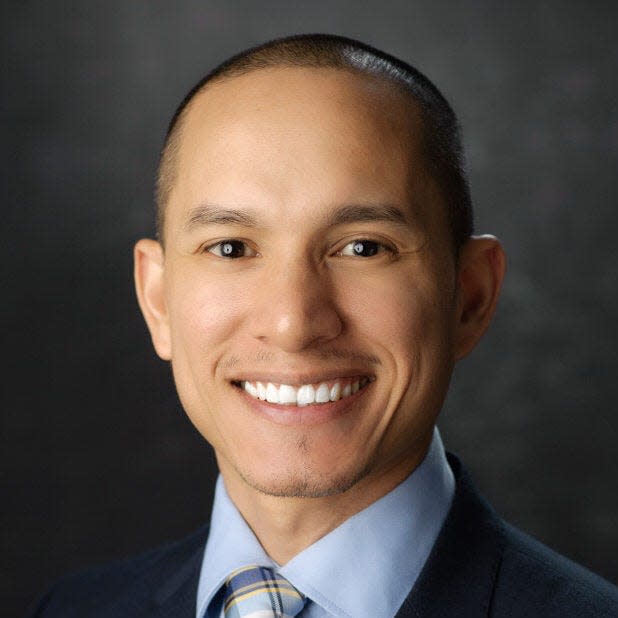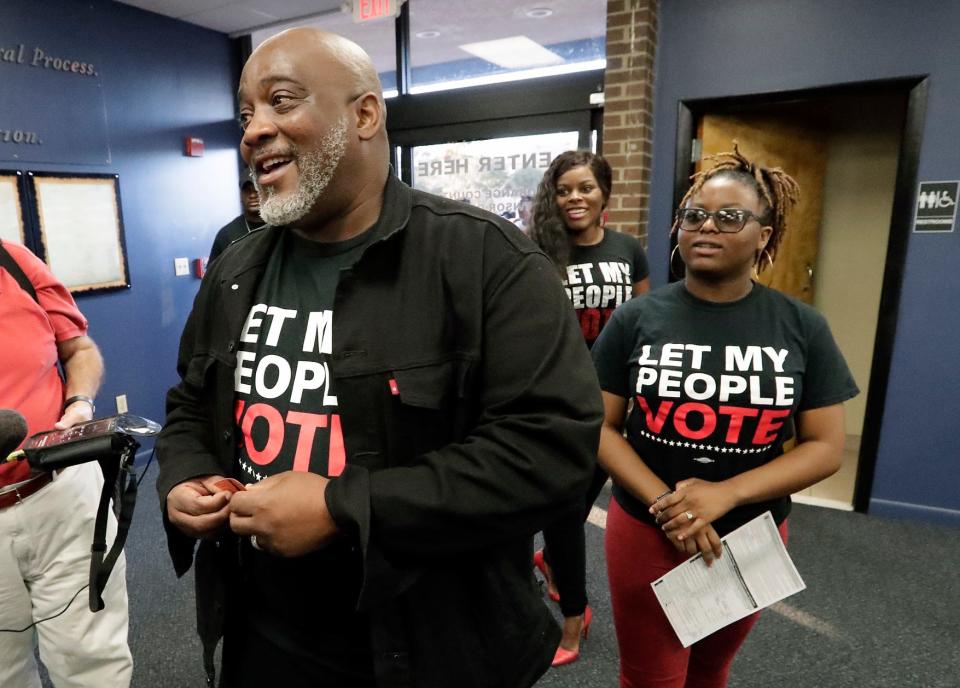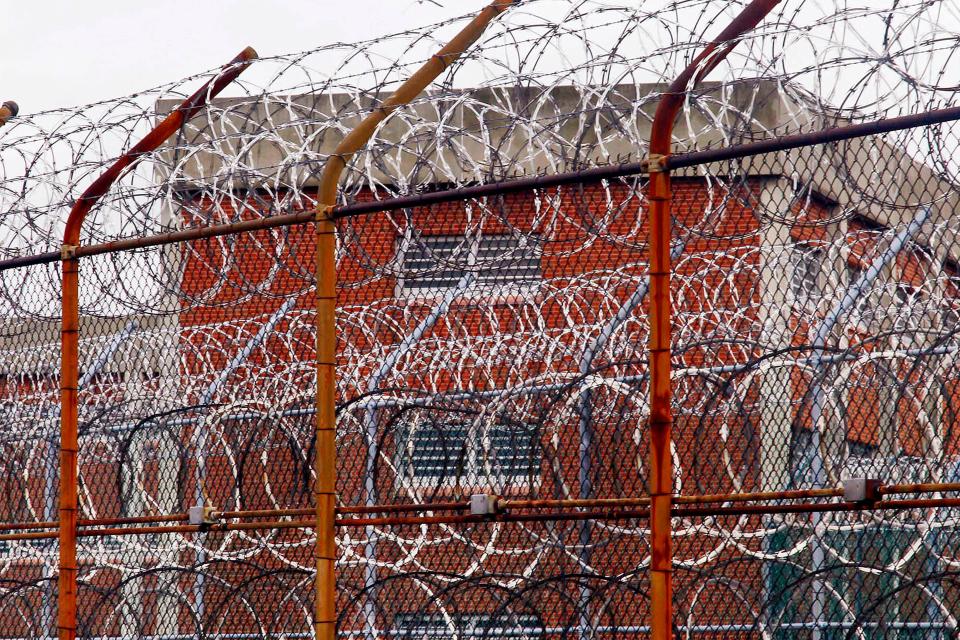My poor decisions landed me in prison. Now I'm making the most of my second chance.
- Oops!Something went wrong.Please try again later.
On the very last day of 2014, I was pardoned by New York Gov. Andrew Cuomo for a crime I committed as a young man making bad choices. My pardon followed a state prison term of nearly seven years.
I know I was given the ultimate second chance, and I’ve used it to take care of my family, give back to my community and serve as an ambassador for those whose life experiences resemble mine.
But most formerly incarcerated people aren’t so lucky. As they struggle to reenter society, many face enormous challenges, including a criminal record that haunts them and exacerbates already daunting obstacles related to jobs, housing, health care and other vital dimensions of everyday life.
Legally justified? The key question isn't whether the officer who shot Patrick Lyoya was afraid
Now, as the United States recognizes April as Second Chance Month, I hope Americans reflect on the national conversation around criminal justice and second chances – and resolve to remove barriers for formerly incarcerated people so they can contribute as full participants in our world.

While there has been significant progress toward this goal, much more can and should be done.
We can build safer communities
The idea behind Second Chance Month dates to 2015, when the administration of President Barack Obama announced a set of measures to promote rehabilitation and help the more than 600,000 people released annually from state and federal prisons better reintegrate into society.
Two years later, the Senate declared April Second Chance Month, which has been observed every year since.
This year, President Joe Biden expressed his support with a proclamation: "By supporting people who are committed to rectifying their mistakes, redefining themselves, and making meaningful contributions to society, we help reduce recidivism and build safer communities."
Can Congress bag a cannabis bill?: Marijuana legalization hopes may be soaring too high.
Such high-level attention has helped. As criminal justice reform has climbed higher on the nation’s agenda in recent years, state legislatures have taken steps to address the negative impacts of a criminal record on a person’s ability to land a job, secure housing, access education, regain the right to vote and otherwise reestablish themselves in free society.
Our culture has begun to reflect this change. In 2019, a formerly incarcerated individual made Time magazine’s "100 Most Influential People" list, while movies such as Michael B. Jordan's "Just Mercy" and documentaries like "13th" have fueled important conversations about race in the criminal justice system and the negative effects of mass incarceration.

And, in a 2020 development that was especially motivating for those who have served time behind bars, attorney Tarra Simmons became the first person convicted of a felony elected to Washington’s state legislature.
Such stories, including my own steady progress to a position of influence with the nonpartisan Council on Criminal Justice, prove that those who have served their time have much to contribute. But formerly incarcerated people still face a vast array of obstacles, and we need substantial policy changes to help ensure transition back to community life is successful.
We should clear hurdles to reentry
One change that would pay significant dividends is the expansion of "clean slate" laws, which have been adopted in five states – and in Congress as well. Details vary, but these measures essentially create a system that automatically clears criminal records for people who remain crime-free for a specified length of time.
Why are such policies necessary? Because the vast majority of hiring managers and landlords conduct background checks, and can see a person’s criminal record and make negative assumptions. And although tens of millions of Americans are eligible to have their criminal records expunged, the process is complex, time-consuming and expensive, discouraging many from even trying. This stigma can be devastating, and Congress and state legislatures need to step up to embrace clean slate laws as a commonsense measure that can reduce it.
Please consider wearing a mask: I’m one of the 3% of Americans who are immunocompromised'
In addition, governors can change lives by making greater use of their pardon power, and more states should enact "fair chance" legislation, which prevents employers from automatically disqualifying job candidates with criminal records.
Another policy area in need of urgent attention is restrictions barring people with convictions from obtaining licenses to enter occupations such as plumbing, real estate, cosmetology and health care. A database developed by the American Bar Association lists thousands of such regulations, many of which are arbitrary and impose barriers related to crimes committed decades ago. Without work that pays a living wage, those leaving prison are vulnerable to the sort of economic desperation that fuels recidivism.
For those in prison, policymakers should adopt "second look" policies that offer an opportunity to petition the court for a sentencing modification under certain circumstances. Second-look provisions encourage participation in prison treatment programs and incentivize positive change, improving the odds of success for those reentering our communities.

Like others whose lives once intersected with the criminal justice system, I appreciate the annual recognition conveyed by Second Chance Month, and can attest that it feels good. But seeing our nation press forward with more substantive change would feel even better, and benefit all of us.
Khalil A. Cumberbatch is director of strategic partnerships at the Council on Criminal Justice, an invitational membership organization and nonpartisan think tank focused on the criminal justice field.
This column is part of a series by USA TODAY Opinion about police accountability and building safer communities. The project began in 2021 by examining qualified immunity and continues in 2022 by examining various ways to improve law enforcement. The project is made possible in part by a grant from Stand Together, which does not provide editorial input.
You can read diverse opinions from our Board of Contributors and other writers on the Opinion front page, on Twitter @usatodayopinion and in our daily Opinion newsletter. To respond to a column, submit a comment to letters@usatoday.com.
This article originally appeared on USA TODAY: My second chance: I spent time in prison. Now I'm giving back.

